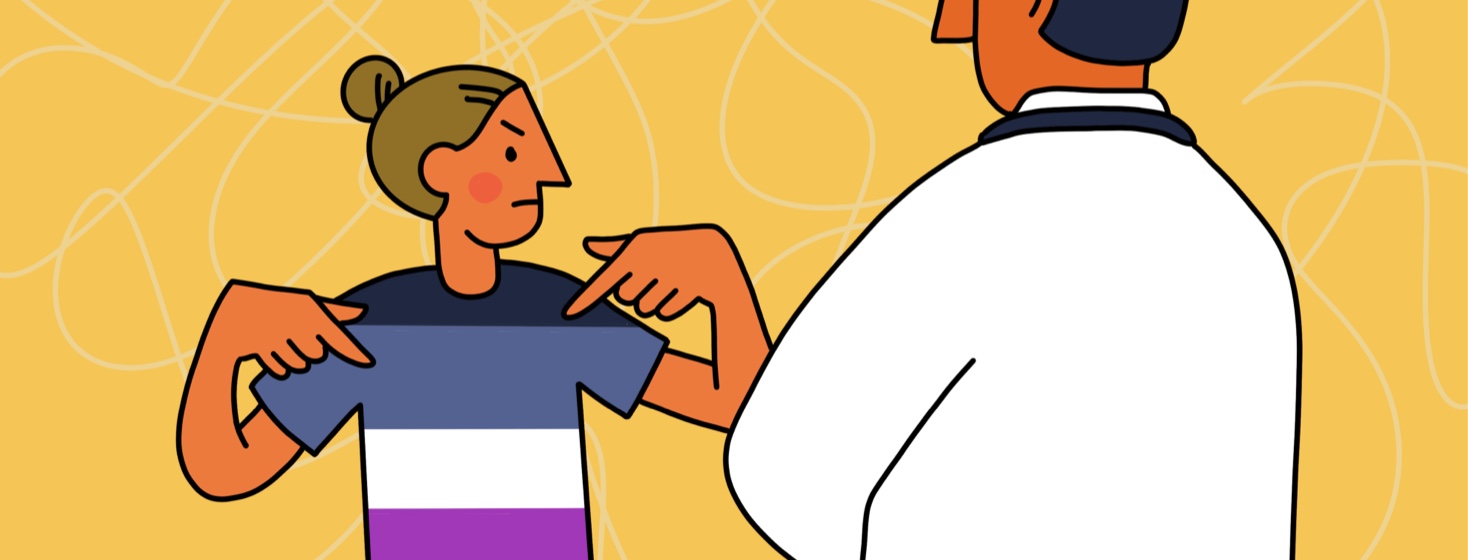Asexuality and Endometriosis
Sometimes, being on the asexual spectrum can mean not receiving the health care that you need and deserve.
Gemma Rutterford, a 34-year-old cis woman living outside Oxford, England, discovered her asexual identity in her late twenties but has only recently come out to friends and family. There have been times when she’s received sub-par care after coming out to doctors as asexual.
Knowing when its time to see a doctor
Rutterford’s had a history of difficult periods since her teen years, and issues with periods run in her family, so at first, she didn’t think much about it. She went on the pill at 19, which masked symptoms.
But when she came off of the pill, things went downhill quickly. She had periods that lasted for 10 days and worsening symptoms. Eventually, pain medications stopped working for her and the pain became so intense she missed work.
“At that point, I knew I had to see a doctor,” she said. At this point, she has not yet had a laparoscopy to diagnose endometriosis, but her doctors suspect she has it.
During the earlier years of the pandemic, Rutterford began having vaginismus symptoms, so she sought care. The practitioner she saw redid some of the exams she’d already had done when she first went to see someone about endometriosis.
Feeling medically dismissed because of sexuality
When the practitioner asked about Rutterford’s sexual activity, Rutterford told the doctor that she is asexual, but sexually active (Rutterford identifies as sex indifferent).
The doctor responded well and even asked Rutterford if she would be comfortable with the exam. This helped Rutterford feel comfortable seeing this doctor going forward.
The doctor ordered an ultrasound but ended up being on holiday the day of the exam, so Rutterford had a different doctor.
“It was a horrible, horrible experience,” she said.
The ultrasound came back normal, which had happened with her regular practitioner. Rutterford said she has been told by her other doctor that endometriosis is suspected.
But then, the doctor started asking her questions about her sexual history. She quickly asked them to pause the line of questioning and started to explain that she is asexual. Then the doctor looked at her medical records and saw Rutterford is on medication for anxiety.
He said, “Oh, yes, I see, you have some complex issues around sex.” Rutterford said the doctor assumed her anxiety was about a fear of sex, and that that was causing her pelvic pain. He suggested therapy.
Doctor won't listen to how I feel
At that point, Rutterford explained that she is not having libido or arousal issues. It was other concerns that brought her to the doctor.
“What I’m concerned about is that I can’t use a tampon, I can’t have a cervical smear test, and I can’t have the internal exams I need because I probably have endometriosis and it’s too painful,” she said.
Rutterford said the doctor was convinced that she was frightened of sex, and he would not take her seriously. Instead, he referred her to psychosexual counseling. She had to do two appointments there and the doctor refused to refer her to gynecology or the nearby endometriosis center.
“He wouldn’t believe me at all, as if I don’t know my own body, my own mind, my own identity,” she said.
Although she didn’t have a choice about attending the therapy sessions, Rutterford’s therapist recognized her asexual identity and was understanding.
Next, Rutterford had to endure yet another physical exam. This time, she had a much better doctor who listened and took her seriously.
This doctor “wrote a letter that’s going on my medical records that says ‘this is what asexuality means, it’s an identity, not a physical problem, and it’s only relevant as far as sometimes not giving an answer to a question’” about sexual history, Rutterford said.
Rutterford feels frustrated that she had to spend time and energy seeing doctors for unnecessary appointments because one doctor didn’t recognize or understand asexuality. She wishes that more doctors in the United Kingdom were trained to work with the LGBTQIA+ community.
“There is a lot of educating still to be done on a lot of LGBTQ identities; I’d say most of them,” she said.

Join the conversation